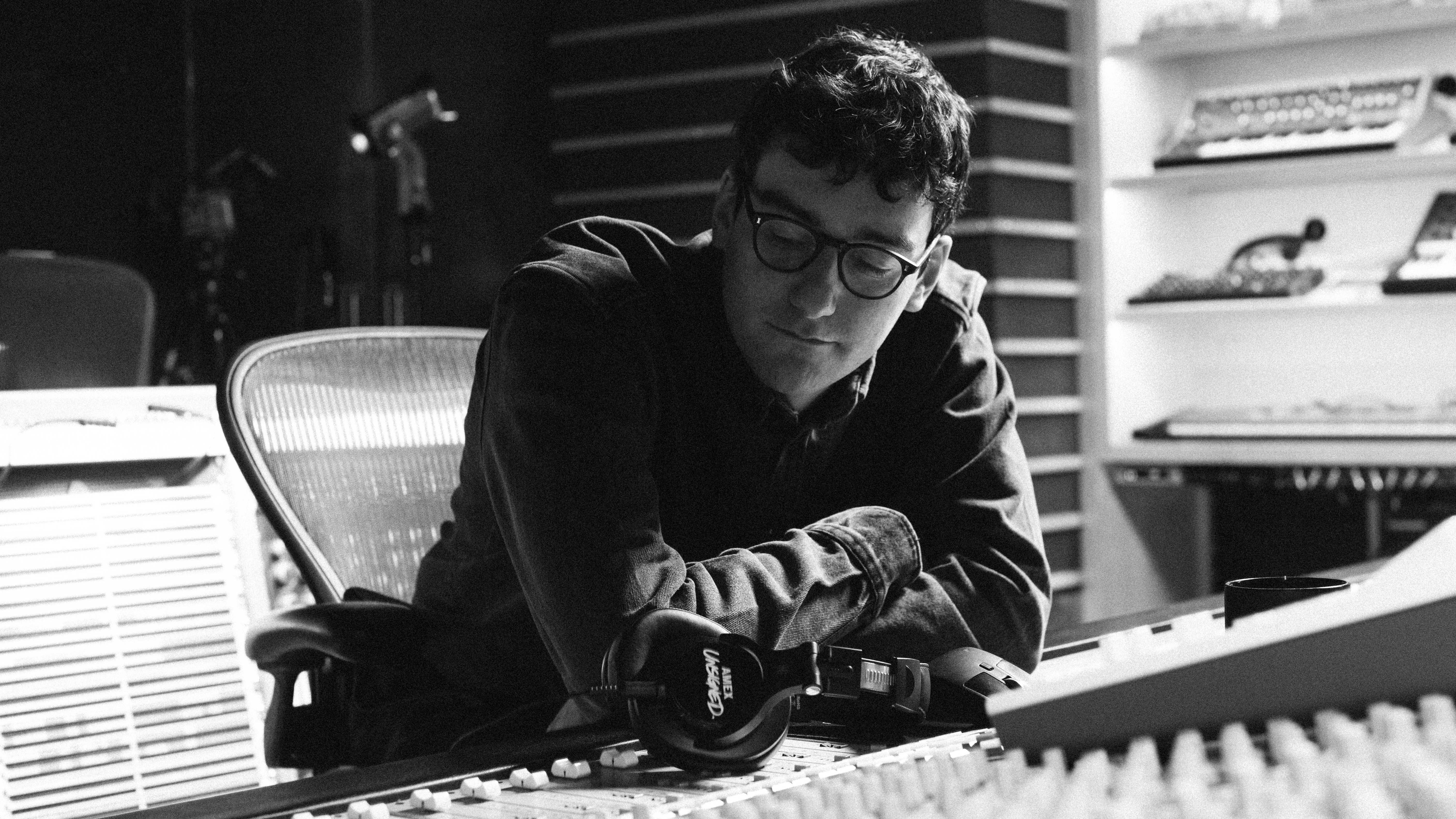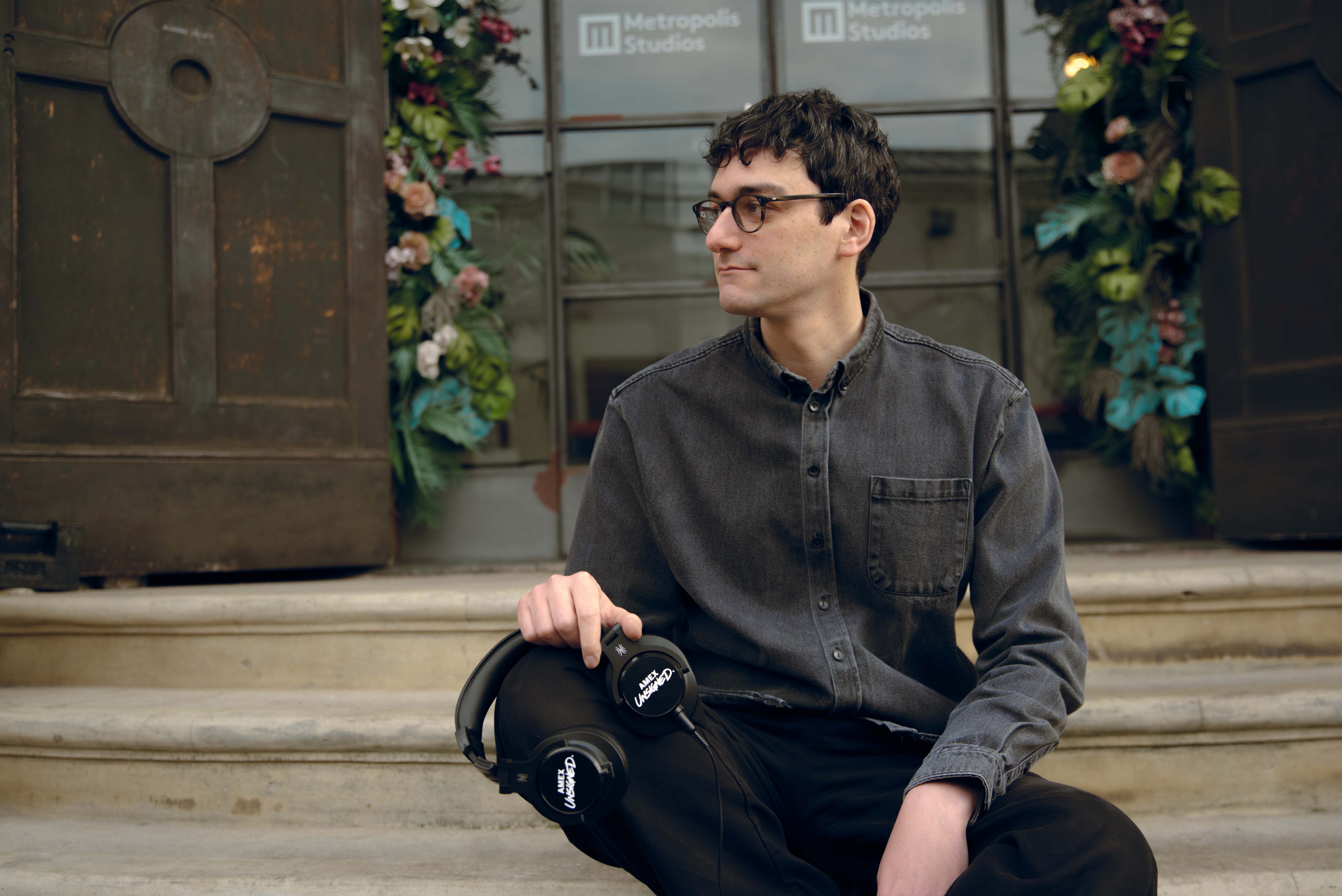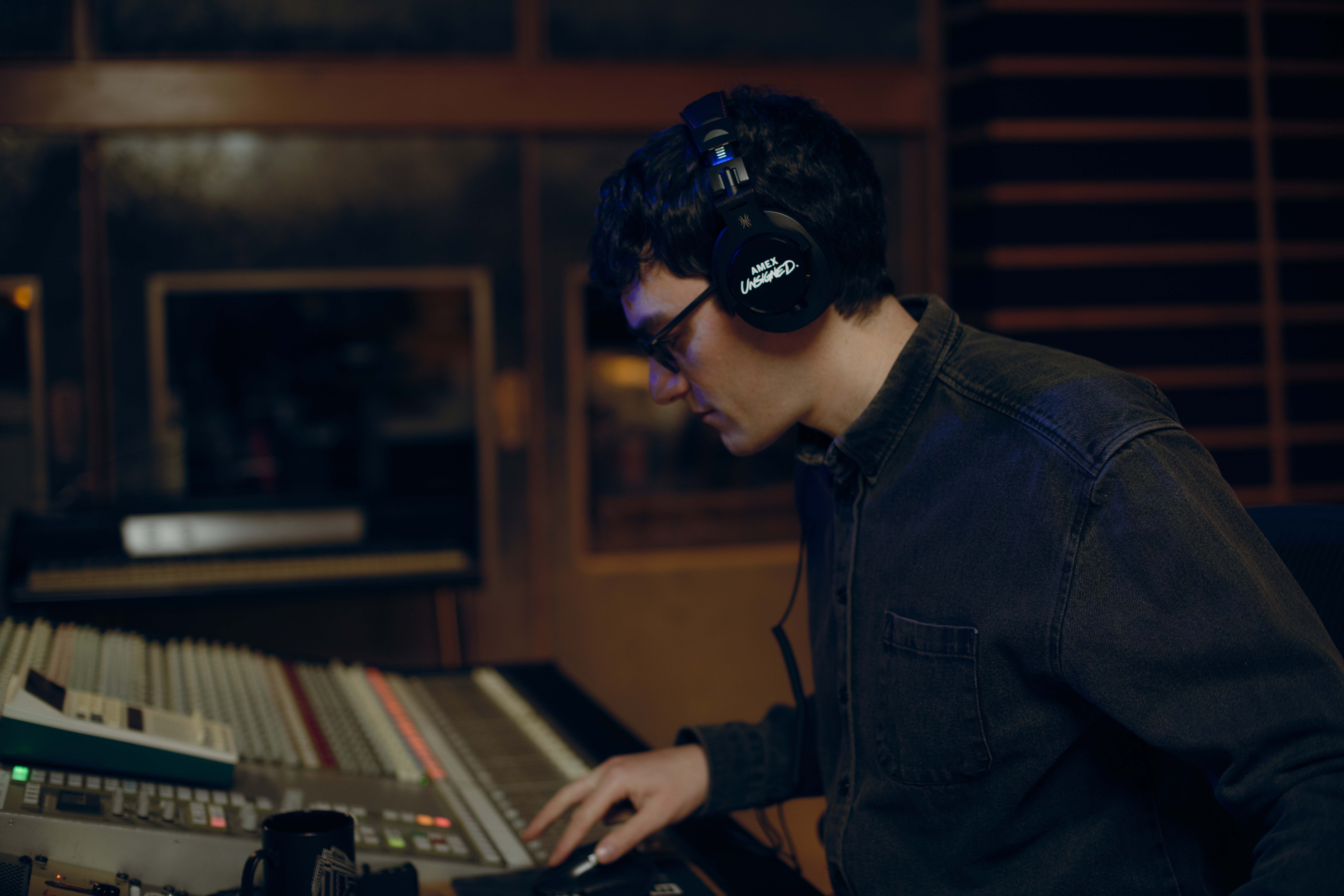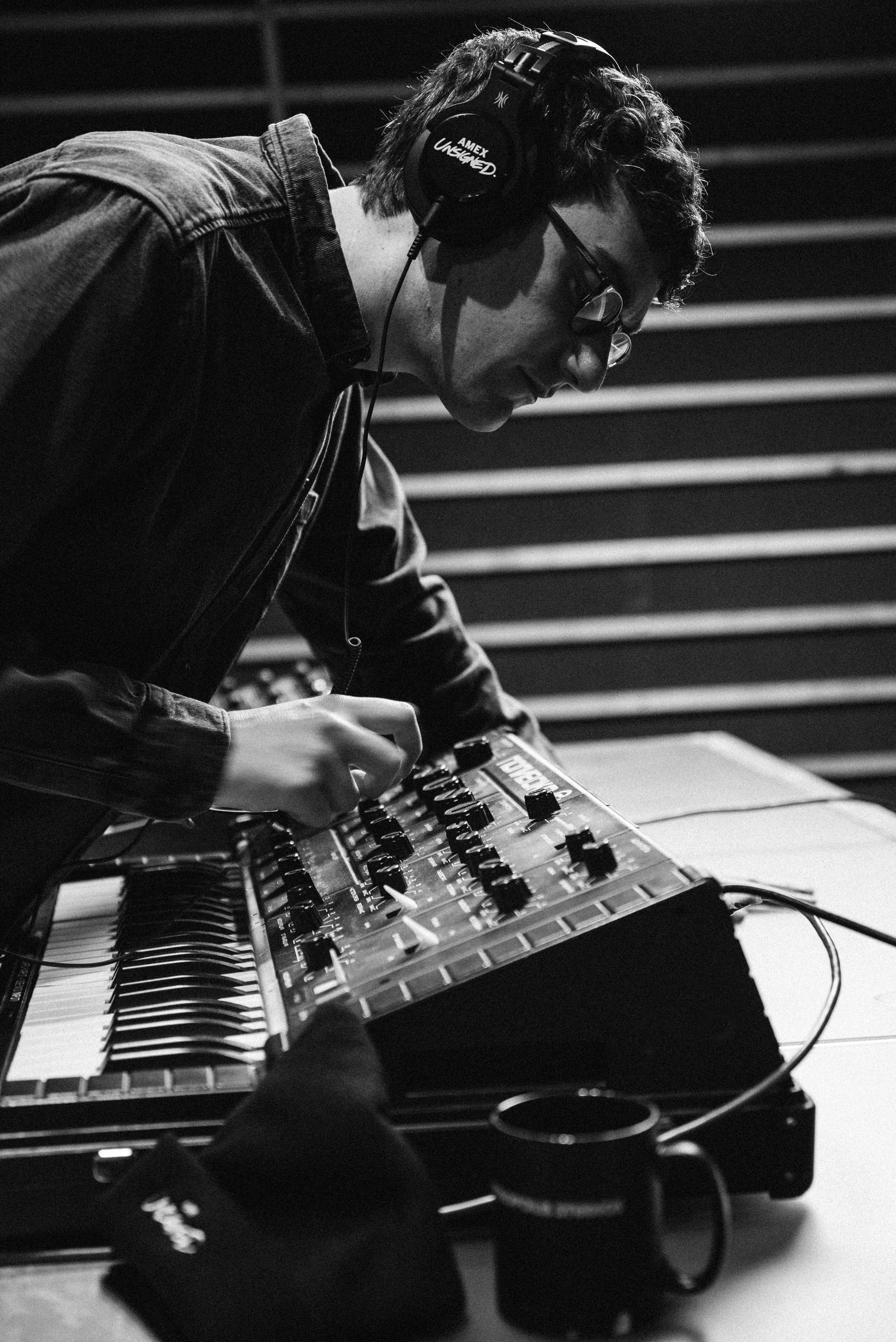“PC Music was just two guys in a room making stuff and uploading it to the internet - that’s where it starts”: Danny L Harle on self-discovery, success and helping unsigned artists find their sound
One of pop's most visionary producers, Harle has worked with Dua Lipa, Charli XCX and Caroline Polachek. Now he's passing on his wisdom to six aspiring music-makers as part of the Amex Unsigned initiative

Want all the hottest music and gear news, reviews, deals, features and more, direct to your inbox? Sign up here.
You are now subscribed
Your newsletter sign-up was successful
PRODUCER WEEK 2025: Launching his career as a founding member of the enduringly influential but now-defunct PC Music collective, Danny L Harle has become one of pop music’s most visionary talents.
Having worked with an extensive list of artists that includes Charli XCX, Chic and Caroline Polachek, Harle was a co-writer and co-producer on Dua Lipa’s chart-topping 2024 album Radical Optimism and most recently masterminded Olly Alexander’s Polari. He's also a prolific remixer and a less-than-prolific solo artist, having released his debut full-length project, the ‘90s rave-inspired concept album Harlecore, in 2021.
Today, Harle is reimagining the sound of contemporary pop, but - like all of us - he was once just a beginner, a student taking bass guitar lessons and tinkering with Logic Express in between classes. All of us must start somewhere, and the guidance that young musicians and producers receive at these crucial early stages of their career can often play a pivotal role in their development.
That’s why Harle is giving six unsigned artists the opportunity of a lifetime as part of the Amex Unsigned initiative. Over three days in London’s Metropolis Studios this week, the producer will be working alongside emerging talent to shape unfinished projects, explore new ideas and provide an informed perspective on their work, offering a group of aspiring music-makers the chance to record with a Grammy-nominated producer in a world-class recording studio.
New research from Amex Unsigned suggests that British unsigned artists are now spending upwards of an estimated £8,000 each year just to perform and record new music
Despite wider access to music-making tools and greater opportunity for self-promotion via social media, many would argue that breaking through as an artist has never been tougher. With more than 100,000 tracks uploaded to Spotify every single day, it's becoming increasingly difficult to be heard above the noise, and in 2025, DIY artists are expected to be producers, content creators, influencers and entrepreneurs all rolled into one.
New research from Amex Unsigned suggests that British unsigned artists are now spending upwards of an estimated £8,000 each year just to perform and record new music, and two thirds of those surveyed believe that improved access to professional studios would boost their chances of success. Through the Unsigned initiative, Amex is giving a lucky few of these artists a helping hand, not only by opening the doors to a top-tier studio, but also by providing mentorship from industry experts and opportunities to perform at sponsored events.
We sat down with Harle to find out more about his involvement in the project, the support that he’ll be offering these ambitious music-makers, and the mentors that helped him find his own path in music.
Want all the hottest music and gear news, reviews, deals, features and more, direct to your inbox? Sign up here.
Hi Danny. What motivated you to take part in the Amex Unsigned project?
“I’m very reluctant to get involved with these sorts of processes unless I feel like I can actually contribute something that’s of worth, but this exact form of mentoring is a process that I’ve personally benefited from in my past, and the opportunities that I’m actually giving young artists are ones that have been useful to me in my own personal development.
“It’s so helpful to take the time to listen to your own work in a studio and reflect back on your entire project - that’s an undervalued thing. There’s a disposable attitude to making music that’s prevalent these days, whereas I think that for young people, there needs to be a sense of respect to one’s own development that should be projected by older people as well.
"As much as I’ve made a bit of a name for myself in the music world, my story has been really specific. People are often surprised by how focused I am in what I do"
“It’s very hard to do that on your own, just to sit down and listen to everything you’ve done. You almost need the discipline of someone else in the room to properly do that. Listening in the room with someone else, you know what’s wrong with the music, if there’s something wrong. You know if it’s really good almost before you’ve played it. That process and that opportunity for young, unsigned artists was a very attractive prospect for this whole partnership.
“I thought it was an exciting thing to be a part of, and something that I could actually contribute to. Because as much as I’ve made a bit of a name for myself in the production world and the music world, my story has been really specific, and I can only do quite specific stuff. People are often surprised by how focused I am in what I do. So it’s very rare that an opportunity comes along where I feel like I can actually give something to people.
“I’m interested in helping young people with their development. There’s been several times in my life where people have helped me, and at the time I didn’t even tell them, because I didn’t even realize they were helping me until much later. It was my old bass guitar teacher - I’ve since had to email them saying, ‘you said some really valuable stuff to me, and I’m sorry I shrugged it off!’”

What was it that your teacher told you?
“It was to not underestimate other people doing music; to try to see the potential in people. When everybody’s young and trying out new stuff, it made me more forgiving of somebody who wasn’t immediately really good at something. When you’re a teenager, you’re more judgemental. It made me more forgiving when I was collaborating with people, to just allow them more time to grow into what they were doing.
“Some of these people that were taking a bit more time to get into the swing of what they were doing ended up becoming some of the most virtuosic musicians. People who show an initial flair don’t necessarily hold that their whole life - people grow at different rates.”
You’re spending half a day in the studio with each artist. What kind of support will you be offering them?
“I’m very excited to give any kind of help I can, even if it’s just a listening thing, or giving comments, I’ll do whatever is possible. But honestly, if I see somebody’s already got their own thing going on, sometimes the best thing you can do is just be like, ‘keep going!’
“When you’re making your own thing, sometimes it’s quite a lonely process, and it can be really helpful for someone to just listen to what you’re making and be like, ‘this is really good’. When someone’s making amazing stuff, it can be really valuable to just tell them: ‘Just keep doing that - you’re doing your thing, that’s all one can do.’”
"People that achieve a certain level of success can start to rest on their laurels. They need someone to come in the studio and say, 'you could be pushing a bit harder here'"
“Or in fact, sadly, it can be really useful to hear someone tell you that you can do better. I wouldn’t just say that to anyone; I’d make sure that they’re somebody who’s in a position to take it, or somebody that knows me well enough. But that’s an important thing for some people to hear as well, because some people that achieve a certain level of success can start to rest on their laurels. They need someone to come in the studio and say, ‘you could be pushing a bit harder here’. That’s what me and my friends are like, we push each other in a really good way.”
How hands-on will you be getting? Would you contribute some material to a project if you felt like that might benefit it? Or will you be sitting back and offering more general advice?
“I will happily do any of those things. It will be a case of listening to the music, meeting the person, and then seeing what I can offer. Then we’ll just take it from there. You need to be versatile in those environments, because everybody works differently. Especially people who've been making their own project on their own, they can be quite idiosyncratic in the way that they've done things, so maybe just offering verbal advice is more useful, then they can make sense of it for themselves.”
For the artists involved, this is a huge opportunity to absorb some guidance from you, but do you feel like there’s anything that you can learn from the experience?
“Always. I’m always interested in what other people are listening to, it’s an endless fascination of mine, because I’m so specific in what I listen to. I’m always interested, especially if they’re from other countries or involved in different scenes, I’ve found that interesting my whole life.”
You mentioned your bass guitar teacher. Is there anyone else that’s acted as a mentor or given you a particularly valuable piece of advice in your own career?
“I used to work in a classical record shop on Great Marlborough Street, Harold Moore’s Records. They stocked both ancient music and very contemporary music, that was their main thing; it was a very interesting shop that sadly no longer exists.
“One day after the shop had closed, the head buyer and curator there put on a CD, it was Nicki Minaj and David Guetta’s Turn Me On. He was just dancing around to it, and that slightly blew my mind. He was this head buyer for a classical record shop, but he had this complete sense of freedom with music; the fact that to him, it was all just CDs and that was the leveller, I found a really fascinating attitude.
"It was a formative moment where I realized I could actually just like everything at the same time, in a big cloud of influence"
“I liked lots of different kinds of music, but I was still stuck in that teenage, compartmentalizing, social thing that you’re forced to do. But then I see somebody who just saw it all as CDs - ‘oh, what’s on this CD? It’s a Wagner opera. What’s on this CD? It’s Girls Aloud’. It was all just an exciting discovery process with no sense of cultural baggage, and that was very freeing for me. It was a formative moment where I realized I could actually just like everything at the same time, in a big cloud of influence. That paved the way for the style of music that I like to make.”
If you could spend half a day in the studio with anyone from musical history and learn something from them, who would you choose and why?
“I would like to hang out with Monteverdi whilst he was writing the Monteverdi Vespers. I’d like to hang out with John Dowland whilst he was writing his first book of songs. Although they’d probably both be really difficult people to hang out with at those times, and also I don’t speak Italian. [laughs]
“I’d also like to hang out with Max Martin in the ‘90s, just after the Cheiron Studios, Denniz Pop era, when they were creating that genre that they made for the Backstreet Boys and Britney Spears, with all those big orchestra hits and pianos and vocal layering going on.

“The thing that I find fascinating about that is that truly industrial sound. I don’t mean that in an industrial techno kind of way, I mean that it’s literally the sound of the music industry, like true, earnest pop music. It’s not pop music that’s pretending to not be pop music, it’s like: this is shiny, shiny pop music. There’s something very pure about that.
“They’re very simple-sounding songs that actually have a very intricate and technical interior. That rings true with all my favourite types of music, and you could say the same of lots of classical music that’s resonated throughout history. It seems very simple and has whistleable tunes, but actually, if you listen to the piece, there’s so much intricacy to it.”
With so much more music being released than ever before, it’s becoming harder for artists to break through. What advice would you share with aspiring artists trying to get their voice heard?
“There’s a really famous Stravinsky quote about young composers in the ‘50s. He said that all young composers have something to present, but the best ones have something to say. I think that is the key: to have something to say, to have a point of view about how music should sound. To be literally making a point in terms of your lyrics, or to be expressing yourself and your own identity. To have something to say is the key.”
How long did it take you to figure out what you wanted to say?
“My problem was that I didn't realize that I was saying something the whole time. At first, I tried to become a very versatile producer. I had a fantasy of myself being this kind of hired-gun style producer who could do any genre, or hear what makes one genre sound good and make an amazing song in that. I really, really wanted to be like that. But as I saw what stuff of mine was resonating, and what stuff of mine I was truly happy with, it turned out that I could only really make music that I wanted to listen to.
“I couldn’t make music in a style that I didn't like, whereas I know people who can make an incredible song in a style that they don't really like. That style of production talent still bowls me over to this day, that kind of really versatile thing, but that's not what I can do, and it took me a long time to realize that. I can only work with people who like the same kind of thing that I do, and who know a bit about my music as well. It's not what I wanted for myself, but now I realize that's what I do.”

It’s a totally different kind of skill, isn’t it, that ability to be a musical chameleon and adapt yourself to any style…
“Completely different. There has to be a moment where you realize who you actually are versus who you think you are. Some people don't believe that there's a difference between those two things, but I personally do. The rather sickening therapy word for it is alignment. Once you align who you think you are with who you actually are, and what your actual abilities are, that's what makes you the happiest that you could be.”
If you could jump in a time machine back to the stage of your career that these artists you’ll be working with are at and give yourself a piece of advice, what would it be?
“That’s a very difficult question to answer. I talk to other producers and artists about this a lot. What advice can you actually give young people? Because a lot of the advice I was given was correct, but I only realized it was correct a long time afterwards, when I'd already done it. People say ‘be yourself’ to young people all the time, and it's true, but you only realize that it’s true once you've been yourself and you've actually done it.
“It's a really difficult thing. What I would actually do, if I did have that time machine, is just be really positive and encouraging about the things in my own music and my own trajectory that were strong about my identity. I would say, ‘don't worry about the elements of your music that don't fit in with what's happening right now’.
“It's the stuff that feels very confidently ‘you’ that, if you stand by it, will be the most resonant and the most important to other people. That’s the stuff that feels the most stupid when you're making it, because it feels random and disconnected from everything, but that’s why it's good and important.
"PC Music was just two guys in a room making stuff and uploading it to the internet"
“I was part of PC Music, and made a lot of this initial stuff with A. G. Cook, and that was just two guys in a room making stuff and uploading it to the internet. There was nothing more to it than that. But that’s where it starts. We were sending it around to people for a long time, and it just wasn't going anywhere. I don’t think there’s anything that can be said other than words of encouragement: ‘this is really good. Don't worry. If you think it's really good, it is really good, and someone will eventually understand it.”
I suppose that often, when you most need a certain piece of advice, you’re not always in the right place to be receptive to it.
“Absolutely not. I wasn’t willing to let anyone tell me anything early on. Apart from Hudson Mohawke, I would’ve accepted anything from Hudson Mohawke when I was younger. He would’ve been great. He was great when I met him; he was really positive and generous and so nice. He was my absolute hero.”
For the artists you’re working with this must be a hugely pivotal moment. Can you identify a similar moment in your own career that placed you on the path to success?
“It depends on your definition of success. That’s also an important distinction to make, because the moments that give you financial gain, in my world, are a direct result of you making very confident artistic statements that aren’t financially viable. So there’s this balance between the two, and it’s a difficult balance to master.
"If I think back on what my successes are, it’s not making a name for myself or releasing music that’s been successful. It’s usually when I managed to write a certain melody, or a turn of phrase, or a chord"
“If I think back on what my successes are, it’s not making a name for myself or releasing music that’s been successful. It’s usually when I managed to write a certain melody, or a turn of phrase, or a chord, or something like that. It’s these moments of musical success where I’ve managed to create a thing which is the music that I want to hear in the world.
“If it sounds like a me-style melody, for me, that is the apex of success. An example of that is the melody on the song Forever, which is a really early track of mine. After I wrote it, I was like: ‘this is the thing’ - and for me, that’s a very important feeling.”
American Express’s 2025 Unsigned initiative backs UK grassroots venues and helps create breakthrough opportunities for emerging music talent through unparalleled access to live gigs, ad syncs and mentorships. This Spring, the 2025 shortlisted six unsigned artists received half a day of studio time with renowned producer, artist and composer Danny L Harle at London’s iconic Metropolis Studios. Find out more about the initiative here.

I'm MusicRadar's Tech Editor, working across everything from product news and gear-focused features to artist interviews and tech tutorials. I love electronic music and I'm perpetually fascinated by the tools we use to make it.
You must confirm your public display name before commenting
Please logout and then login again, you will then be prompted to enter your display name.